HA3042 Taxation Law T1 2018: Personal Exertion, Income & CGT
VerifiedAdded on 2023/06/12
|8
|1375
|335
Homework Assignment
AI Summary
This assignment solution delves into various aspects of taxation law. It addresses whether payments received by Hilary, a mountain climber, for her life story, manuscript sales, and photographs constitute income from personal exertion. It references relevant sections of the ITAA 1997 and case law to support the analysis. Furthermore, the assignment explores the character of income in the context of a loan between a mother and son and discusses the implications of capital gains tax (CGT) on assets acquired before and after the introduction of the CGT regime, including the sale of property to a daughter. The solution also briefly touches upon the impact of company ownership on property amortization and payments.
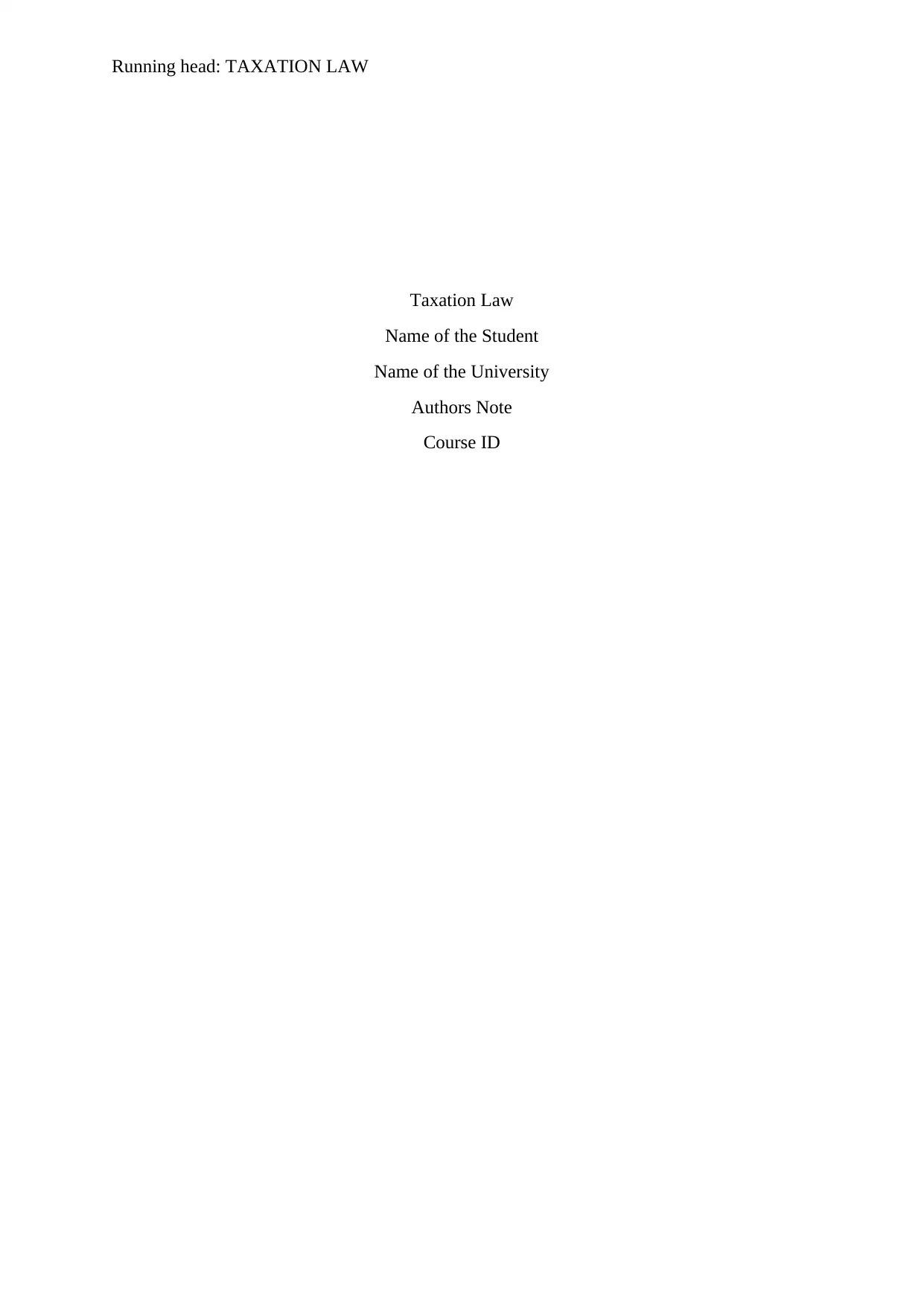
Running head: TAXATION LAW
Taxation Law
Name of the Student
Name of the University
Authors Note
Course ID
Taxation Law
Name of the Student
Name of the University
Authors Note
Course ID
Paraphrase This Document
Need a fresh take? Get an instant paraphrase of this document with our AI Paraphraser
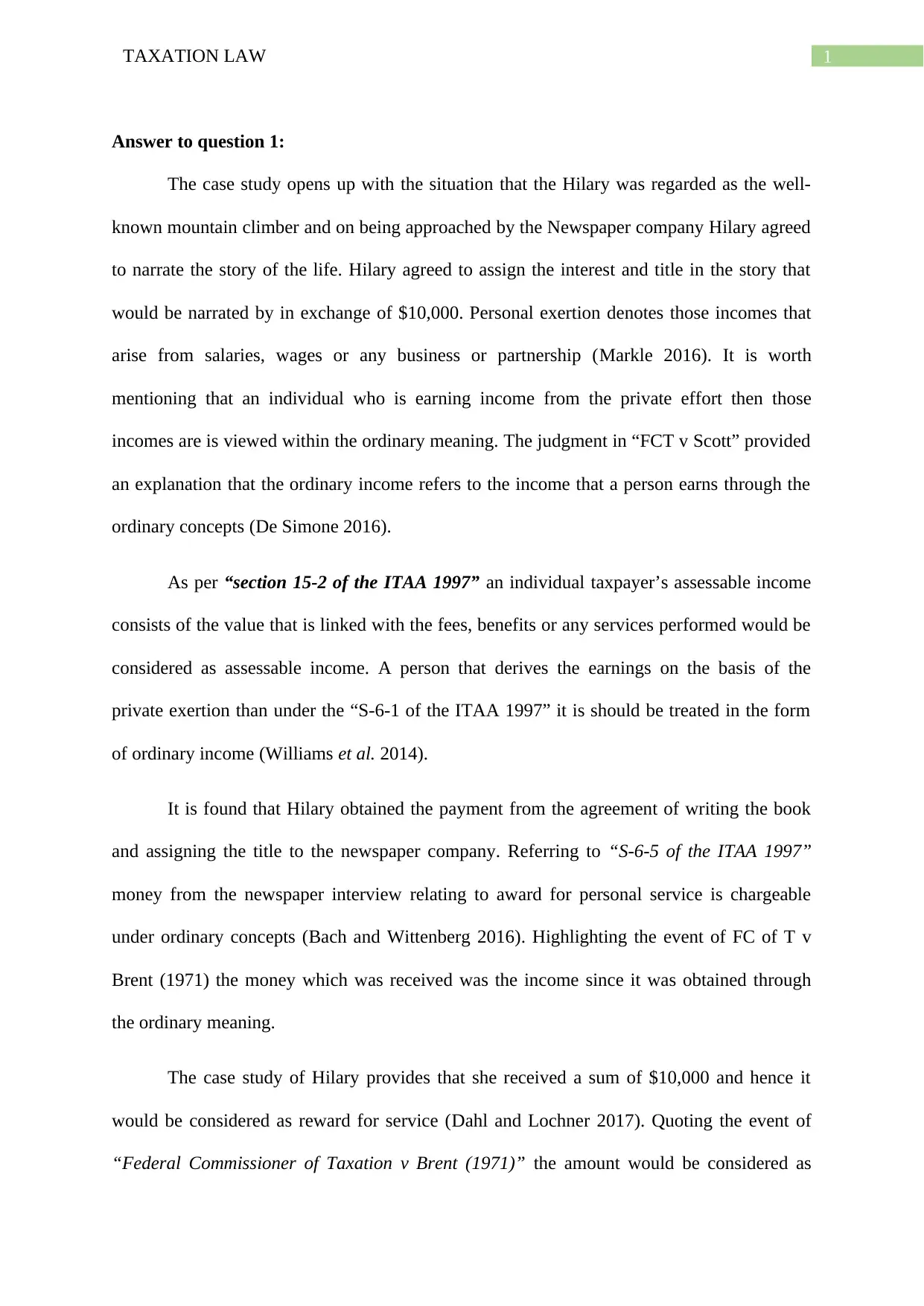
1TAXATION LAW
Answer to question 1:
The case study opens up with the situation that the Hilary was regarded as the well-
known mountain climber and on being approached by the Newspaper company Hilary agreed
to narrate the story of the life. Hilary agreed to assign the interest and title in the story that
would be narrated by in exchange of $10,000. Personal exertion denotes those incomes that
arise from salaries, wages or any business or partnership (Markle 2016). It is worth
mentioning that an individual who is earning income from the private effort then those
incomes are is viewed within the ordinary meaning. The judgment in “FCT v Scott” provided
an explanation that the ordinary income refers to the income that a person earns through the
ordinary concepts (De Simone 2016).
As per “section 15-2 of the ITAA 1997” an individual taxpayer’s assessable income
consists of the value that is linked with the fees, benefits or any services performed would be
considered as assessable income. A person that derives the earnings on the basis of the
private exertion than under the “S-6-1 of the ITAA 1997” it is should be treated in the form
of ordinary income (Williams et al. 2014).
It is found that Hilary obtained the payment from the agreement of writing the book
and assigning the title to the newspaper company. Referring to “S-6-5 of the ITAA 1997”
money from the newspaper interview relating to award for personal service is chargeable
under ordinary concepts (Bach and Wittenberg 2016). Highlighting the event of FC of T v
Brent (1971) the money which was received was the income since it was obtained through
the ordinary meaning.
The case study of Hilary provides that she received a sum of $10,000 and hence it
would be considered as reward for service (Dahl and Lochner 2017). Quoting the event of
“Federal Commissioner of Taxation v Brent (1971)” the amount would be considered as
Answer to question 1:
The case study opens up with the situation that the Hilary was regarded as the well-
known mountain climber and on being approached by the Newspaper company Hilary agreed
to narrate the story of the life. Hilary agreed to assign the interest and title in the story that
would be narrated by in exchange of $10,000. Personal exertion denotes those incomes that
arise from salaries, wages or any business or partnership (Markle 2016). It is worth
mentioning that an individual who is earning income from the private effort then those
incomes are is viewed within the ordinary meaning. The judgment in “FCT v Scott” provided
an explanation that the ordinary income refers to the income that a person earns through the
ordinary concepts (De Simone 2016).
As per “section 15-2 of the ITAA 1997” an individual taxpayer’s assessable income
consists of the value that is linked with the fees, benefits or any services performed would be
considered as assessable income. A person that derives the earnings on the basis of the
private exertion than under the “S-6-1 of the ITAA 1997” it is should be treated in the form
of ordinary income (Williams et al. 2014).
It is found that Hilary obtained the payment from the agreement of writing the book
and assigning the title to the newspaper company. Referring to “S-6-5 of the ITAA 1997”
money from the newspaper interview relating to award for personal service is chargeable
under ordinary concepts (Bach and Wittenberg 2016). Highlighting the event of FC of T v
Brent (1971) the money which was received was the income since it was obtained through
the ordinary meaning.
The case study of Hilary provides that she received a sum of $10,000 and hence it
would be considered as reward for service (Dahl and Lochner 2017). Quoting the event of
“Federal Commissioner of Taxation v Brent (1971)” the amount would be considered as
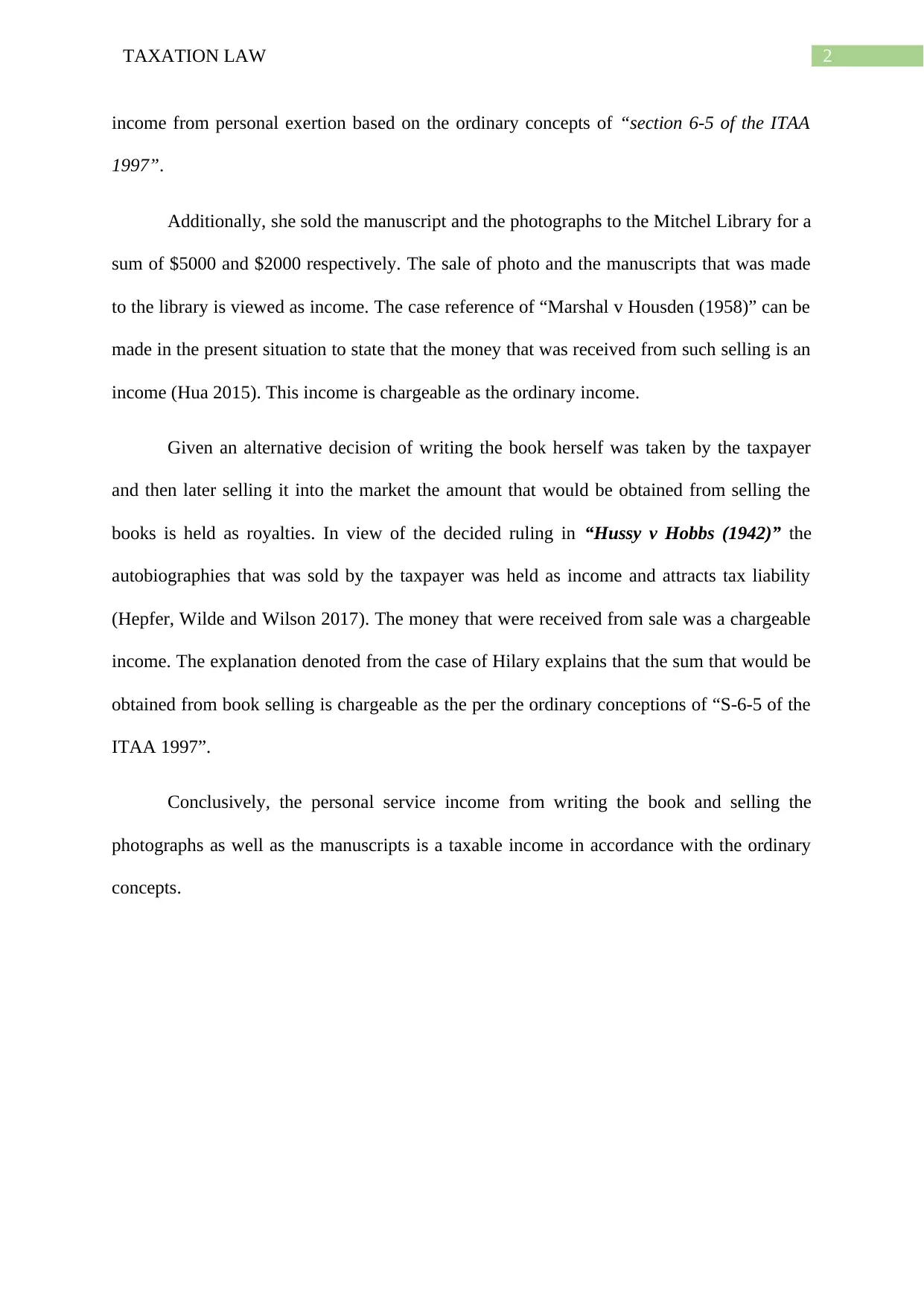
2TAXATION LAW
income from personal exertion based on the ordinary concepts of “section 6-5 of the ITAA
1997”.
Additionally, she sold the manuscript and the photographs to the Mitchel Library for a
sum of $5000 and $2000 respectively. The sale of photo and the manuscripts that was made
to the library is viewed as income. The case reference of “Marshal v Housden (1958)” can be
made in the present situation to state that the money that was received from such selling is an
income (Hua 2015). This income is chargeable as the ordinary income.
Given an alternative decision of writing the book herself was taken by the taxpayer
and then later selling it into the market the amount that would be obtained from selling the
books is held as royalties. In view of the decided ruling in “Hussy v Hobbs (1942)” the
autobiographies that was sold by the taxpayer was held as income and attracts tax liability
(Hepfer, Wilde and Wilson 2017). The money that were received from sale was a chargeable
income. The explanation denoted from the case of Hilary explains that the sum that would be
obtained from book selling is chargeable as the per the ordinary conceptions of “S-6-5 of the
ITAA 1997”.
Conclusively, the personal service income from writing the book and selling the
photographs as well as the manuscripts is a taxable income in accordance with the ordinary
concepts.
income from personal exertion based on the ordinary concepts of “section 6-5 of the ITAA
1997”.
Additionally, she sold the manuscript and the photographs to the Mitchel Library for a
sum of $5000 and $2000 respectively. The sale of photo and the manuscripts that was made
to the library is viewed as income. The case reference of “Marshal v Housden (1958)” can be
made in the present situation to state that the money that was received from such selling is an
income (Hua 2015). This income is chargeable as the ordinary income.
Given an alternative decision of writing the book herself was taken by the taxpayer
and then later selling it into the market the amount that would be obtained from selling the
books is held as royalties. In view of the decided ruling in “Hussy v Hobbs (1942)” the
autobiographies that was sold by the taxpayer was held as income and attracts tax liability
(Hepfer, Wilde and Wilson 2017). The money that were received from sale was a chargeable
income. The explanation denoted from the case of Hilary explains that the sum that would be
obtained from book selling is chargeable as the per the ordinary conceptions of “S-6-5 of the
ITAA 1997”.
Conclusively, the personal service income from writing the book and selling the
photographs as well as the manuscripts is a taxable income in accordance with the ordinary
concepts.
⊘ This is a preview!⊘
Do you want full access?
Subscribe today to unlock all pages.

Trusted by 1+ million students worldwide
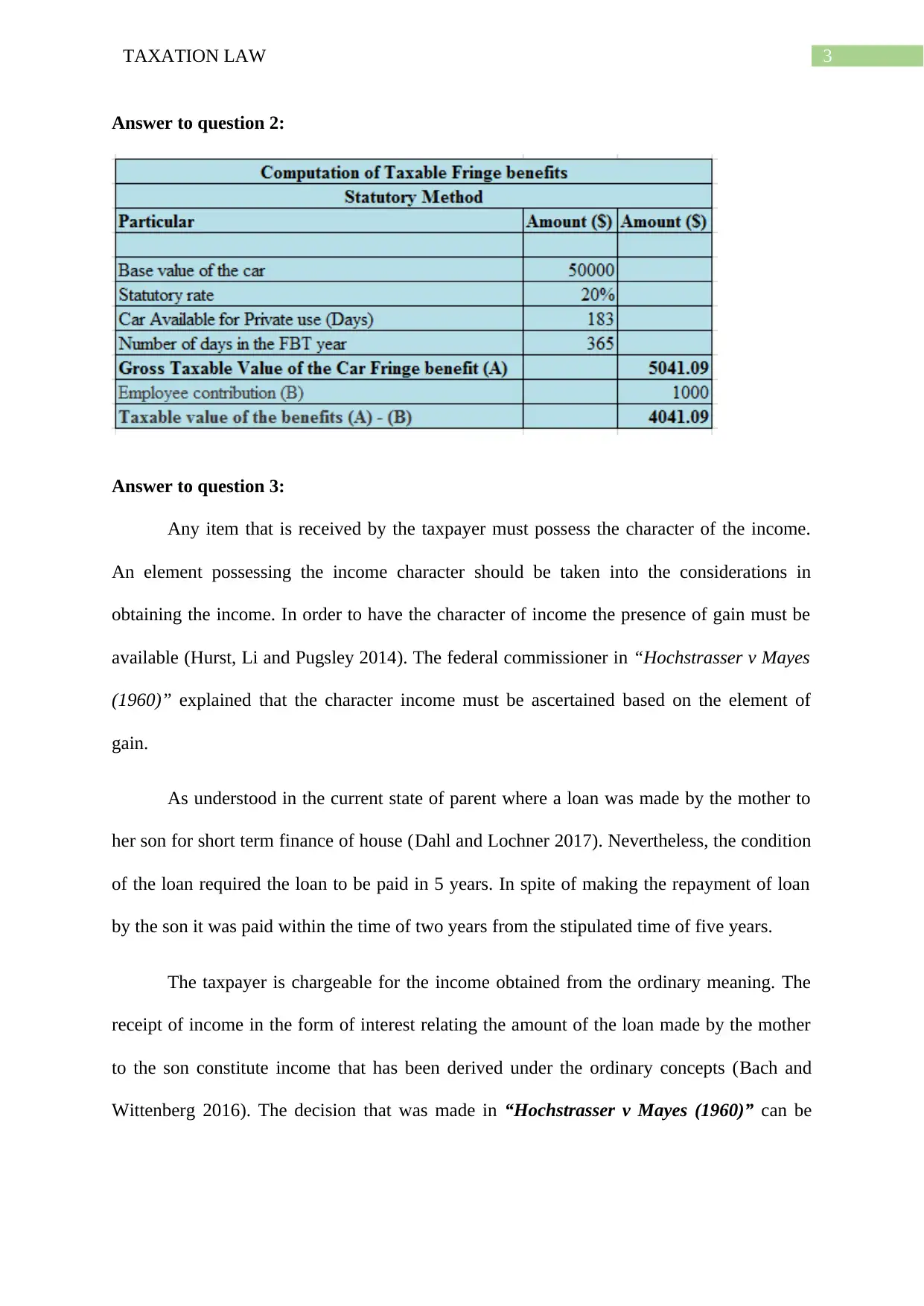
3TAXATION LAW
Answer to question 2:
Answer to question 3:
Any item that is received by the taxpayer must possess the character of the income.
An element possessing the income character should be taken into the considerations in
obtaining the income. In order to have the character of income the presence of gain must be
available (Hurst, Li and Pugsley 2014). The federal commissioner in “Hochstrasser v Mayes
(1960)” explained that the character income must be ascertained based on the element of
gain.
As understood in the current state of parent where a loan was made by the mother to
her son for short term finance of house (Dahl and Lochner 2017). Nevertheless, the condition
of the loan required the loan to be paid in 5 years. In spite of making the repayment of loan
by the son it was paid within the time of two years from the stipulated time of five years.
The taxpayer is chargeable for the income obtained from the ordinary meaning. The
receipt of income in the form of interest relating the amount of the loan made by the mother
to the son constitute income that has been derived under the ordinary concepts (Bach and
Wittenberg 2016). The decision that was made in “Hochstrasser v Mayes (1960)” can be
Answer to question 2:
Answer to question 3:
Any item that is received by the taxpayer must possess the character of the income.
An element possessing the income character should be taken into the considerations in
obtaining the income. In order to have the character of income the presence of gain must be
available (Hurst, Li and Pugsley 2014). The federal commissioner in “Hochstrasser v Mayes
(1960)” explained that the character income must be ascertained based on the element of
gain.
As understood in the current state of parent where a loan was made by the mother to
her son for short term finance of house (Dahl and Lochner 2017). Nevertheless, the condition
of the loan required the loan to be paid in 5 years. In spite of making the repayment of loan
by the son it was paid within the time of two years from the stipulated time of five years.
The taxpayer is chargeable for the income obtained from the ordinary meaning. The
receipt of income in the form of interest relating the amount of the loan made by the mother
to the son constitute income that has been derived under the ordinary concepts (Bach and
Wittenberg 2016). The decision that was made in “Hochstrasser v Mayes (1960)” can be
Paraphrase This Document
Need a fresh take? Get an instant paraphrase of this document with our AI Paraphraser
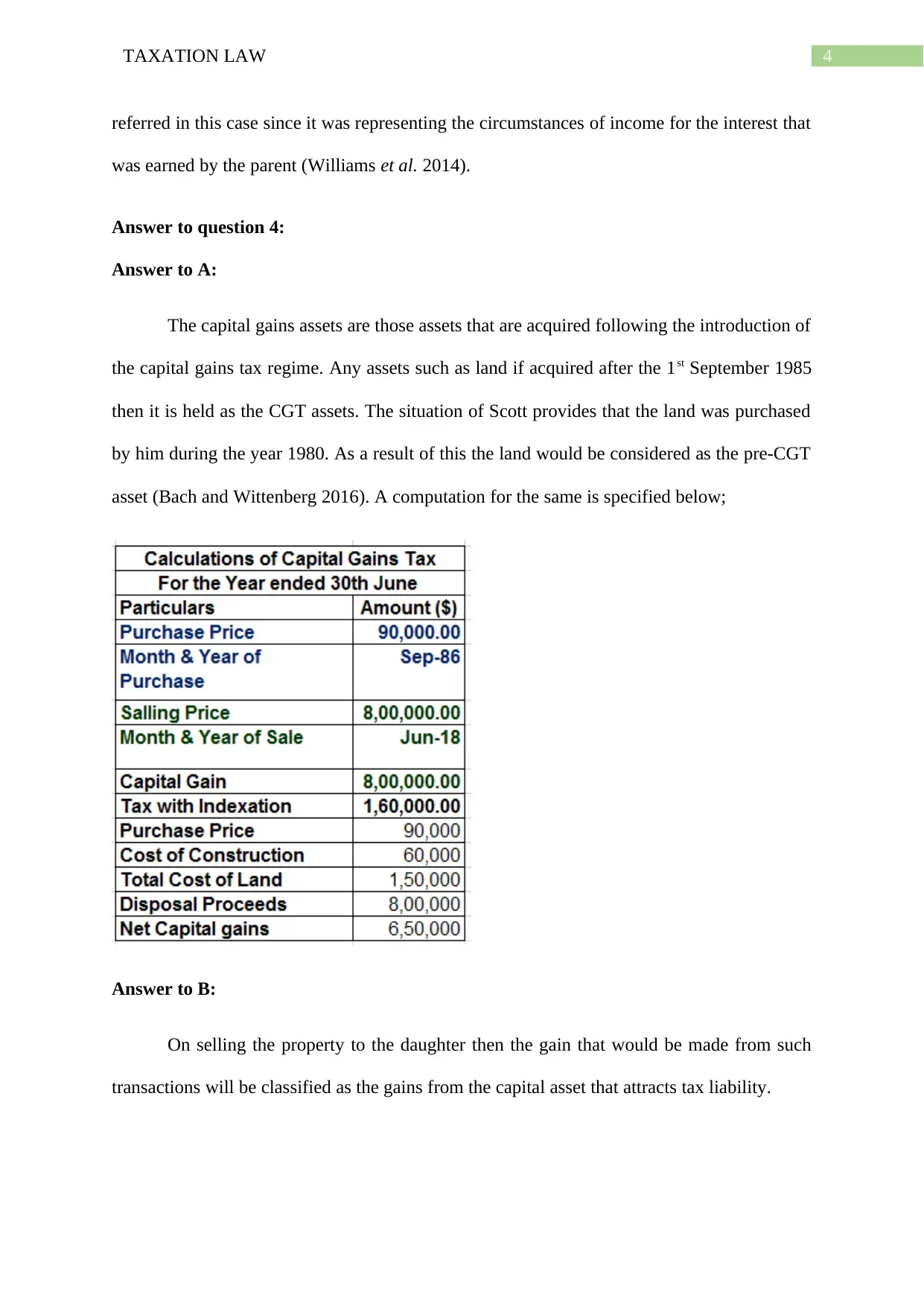
4TAXATION LAW
referred in this case since it was representing the circumstances of income for the interest that
was earned by the parent (Williams et al. 2014).
Answer to question 4:
Answer to A:
The capital gains assets are those assets that are acquired following the introduction of
the capital gains tax regime. Any assets such as land if acquired after the 1st September 1985
then it is held as the CGT assets. The situation of Scott provides that the land was purchased
by him during the year 1980. As a result of this the land would be considered as the pre-CGT
asset (Bach and Wittenberg 2016). A computation for the same is specified below;
Answer to B:
On selling the property to the daughter then the gain that would be made from such
transactions will be classified as the gains from the capital asset that attracts tax liability.
referred in this case since it was representing the circumstances of income for the interest that
was earned by the parent (Williams et al. 2014).
Answer to question 4:
Answer to A:
The capital gains assets are those assets that are acquired following the introduction of
the capital gains tax regime. Any assets such as land if acquired after the 1st September 1985
then it is held as the CGT assets. The situation of Scott provides that the land was purchased
by him during the year 1980. As a result of this the land would be considered as the pre-CGT
asset (Bach and Wittenberg 2016). A computation for the same is specified below;
Answer to B:
On selling the property to the daughter then the gain that would be made from such
transactions will be classified as the gains from the capital asset that attracts tax liability.
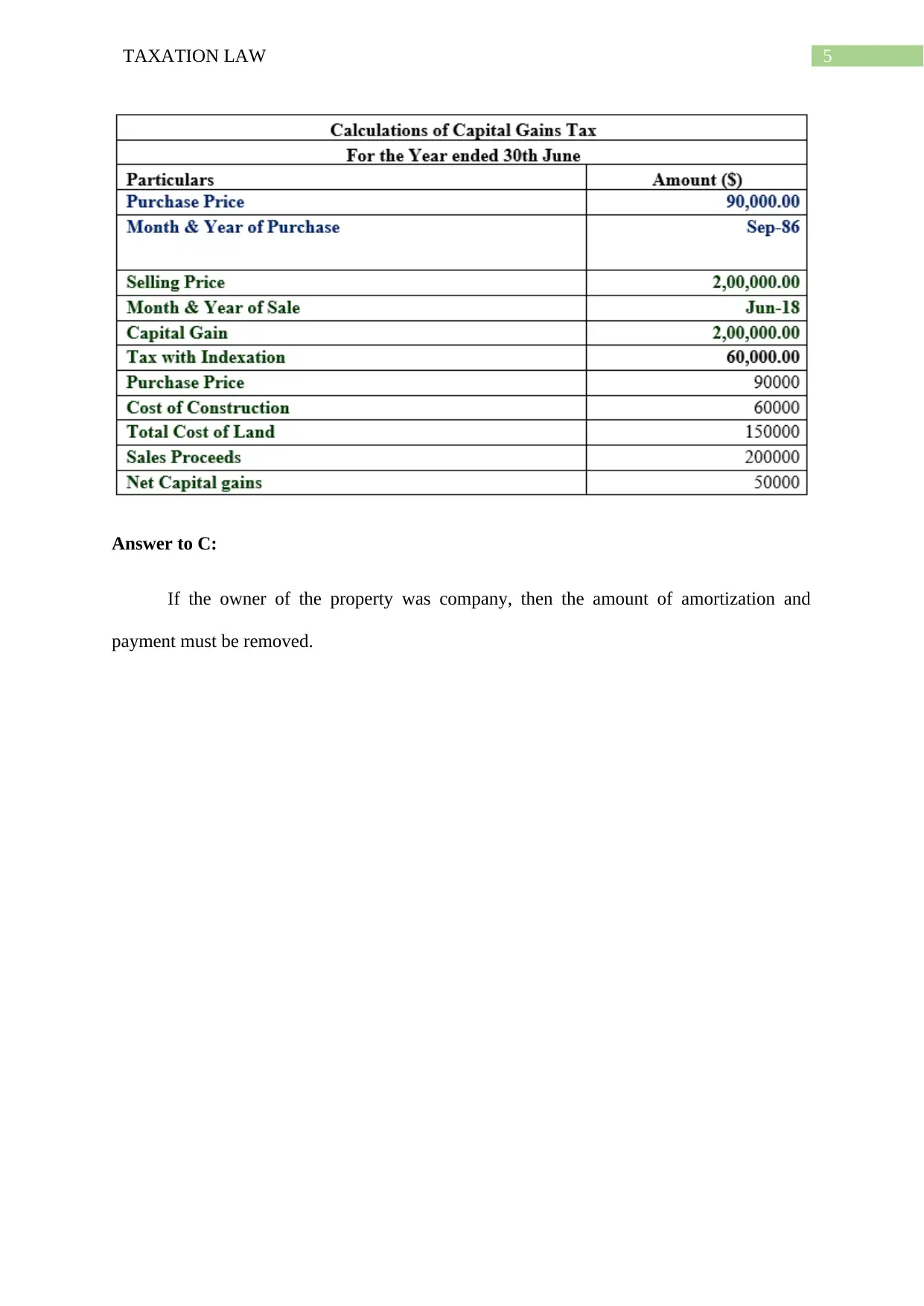
5TAXATION LAW
Answer to C:
If the owner of the property was company, then the amount of amortization and
payment must be removed.
Answer to C:
If the owner of the property was company, then the amount of amortization and
payment must be removed.
⊘ This is a preview!⊘
Do you want full access?
Subscribe today to unlock all pages.

Trusted by 1+ million students worldwide
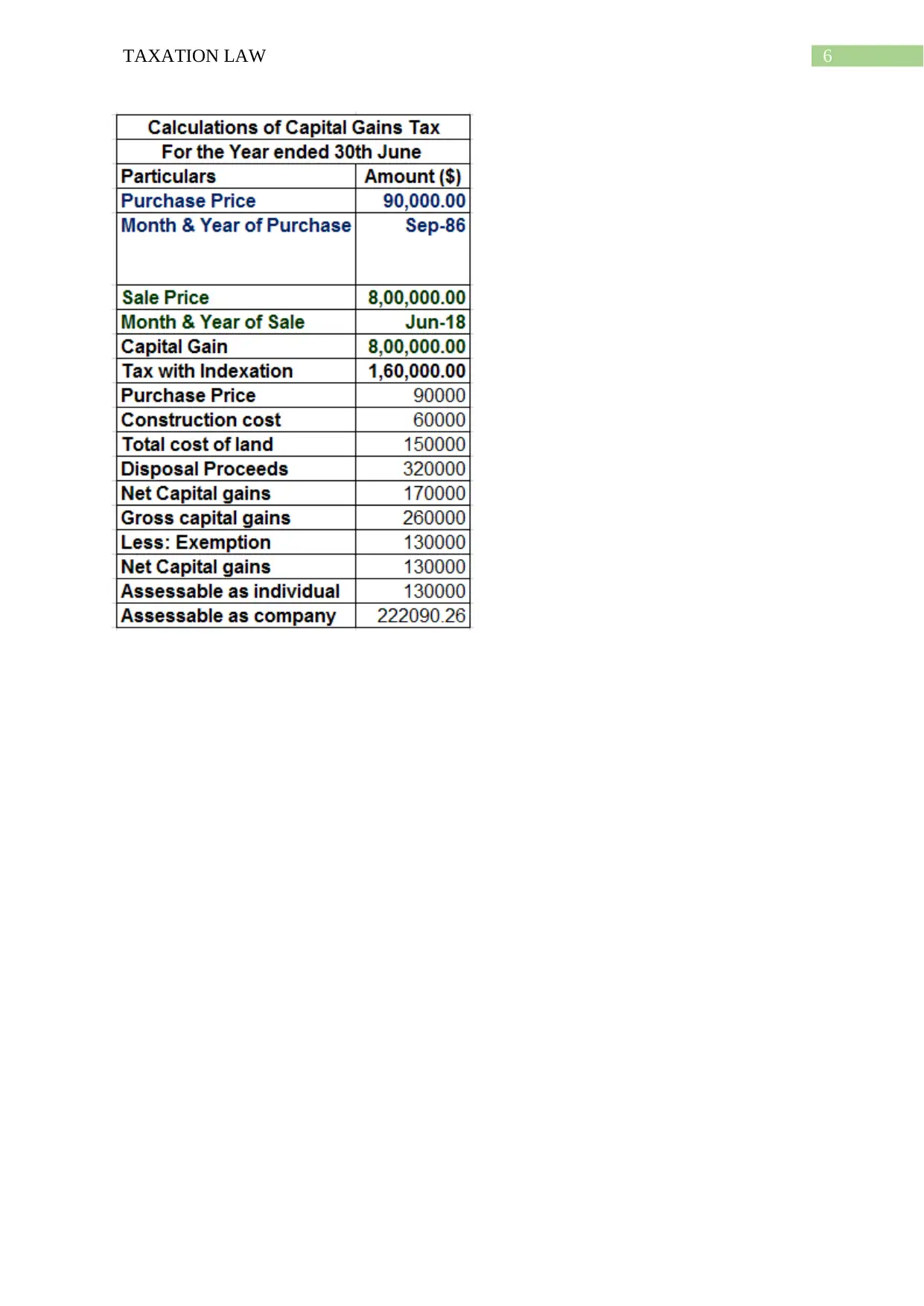
6TAXATION LAW
Paraphrase This Document
Need a fresh take? Get an instant paraphrase of this document with our AI Paraphraser
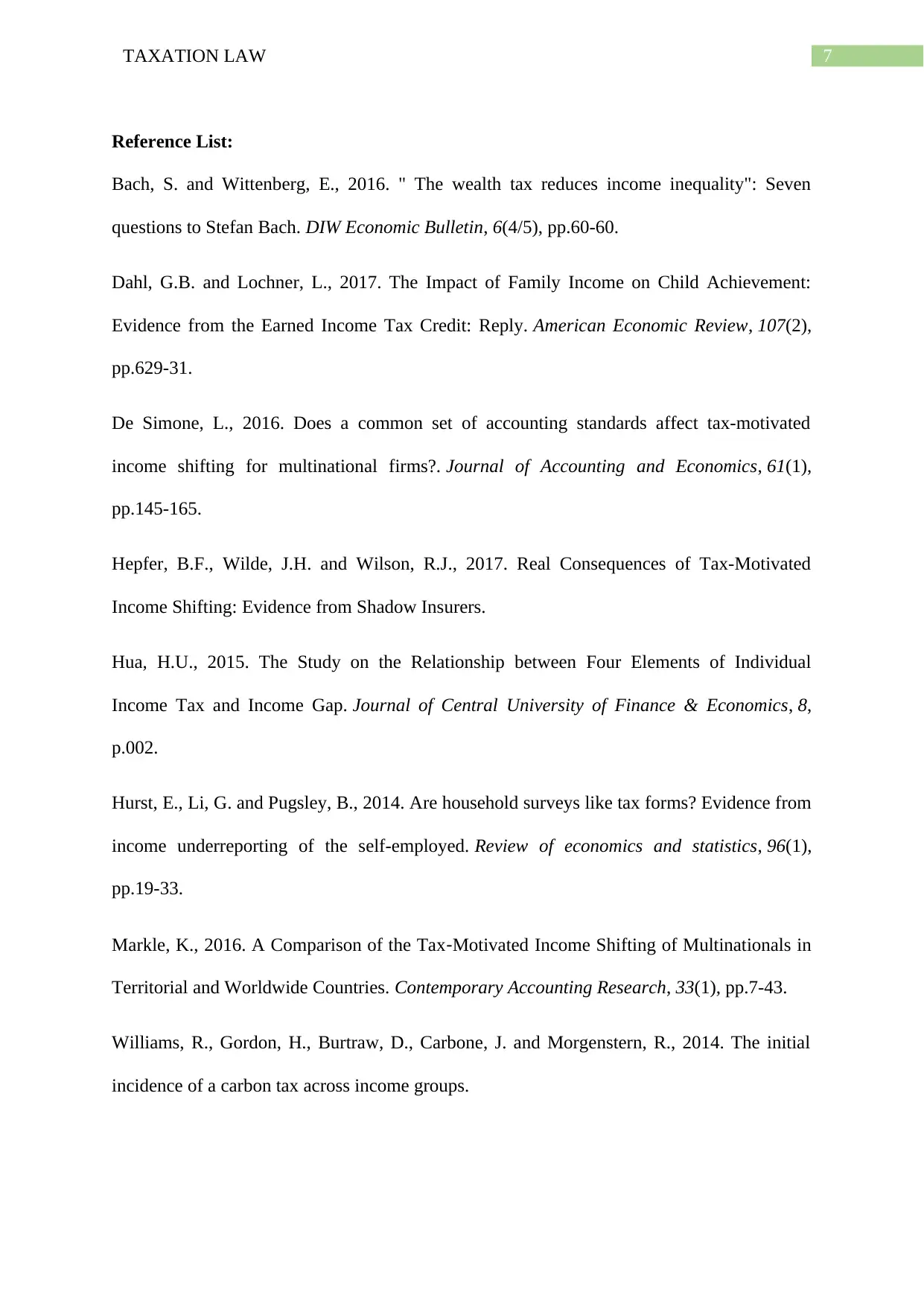
7TAXATION LAW
Reference List:
Bach, S. and Wittenberg, E., 2016. " The wealth tax reduces income inequality": Seven
questions to Stefan Bach. DIW Economic Bulletin, 6(4/5), pp.60-60.
Dahl, G.B. and Lochner, L., 2017. The Impact of Family Income on Child Achievement:
Evidence from the Earned Income Tax Credit: Reply. American Economic Review, 107(2),
pp.629-31.
De Simone, L., 2016. Does a common set of accounting standards affect tax-motivated
income shifting for multinational firms?. Journal of Accounting and Economics, 61(1),
pp.145-165.
Hepfer, B.F., Wilde, J.H. and Wilson, R.J., 2017. Real Consequences of Tax-Motivated
Income Shifting: Evidence from Shadow Insurers.
Hua, H.U., 2015. The Study on the Relationship between Four Elements of Individual
Income Tax and Income Gap. Journal of Central University of Finance & Economics, 8,
p.002.
Hurst, E., Li, G. and Pugsley, B., 2014. Are household surveys like tax forms? Evidence from
income underreporting of the self-employed. Review of economics and statistics, 96(1),
pp.19-33.
Markle, K., 2016. A Comparison of the Tax‐Motivated Income Shifting of Multinationals in
Territorial and Worldwide Countries. Contemporary Accounting Research, 33(1), pp.7-43.
Williams, R., Gordon, H., Burtraw, D., Carbone, J. and Morgenstern, R., 2014. The initial
incidence of a carbon tax across income groups.
Reference List:
Bach, S. and Wittenberg, E., 2016. " The wealth tax reduces income inequality": Seven
questions to Stefan Bach. DIW Economic Bulletin, 6(4/5), pp.60-60.
Dahl, G.B. and Lochner, L., 2017. The Impact of Family Income on Child Achievement:
Evidence from the Earned Income Tax Credit: Reply. American Economic Review, 107(2),
pp.629-31.
De Simone, L., 2016. Does a common set of accounting standards affect tax-motivated
income shifting for multinational firms?. Journal of Accounting and Economics, 61(1),
pp.145-165.
Hepfer, B.F., Wilde, J.H. and Wilson, R.J., 2017. Real Consequences of Tax-Motivated
Income Shifting: Evidence from Shadow Insurers.
Hua, H.U., 2015. The Study on the Relationship between Four Elements of Individual
Income Tax and Income Gap. Journal of Central University of Finance & Economics, 8,
p.002.
Hurst, E., Li, G. and Pugsley, B., 2014. Are household surveys like tax forms? Evidence from
income underreporting of the self-employed. Review of economics and statistics, 96(1),
pp.19-33.
Markle, K., 2016. A Comparison of the Tax‐Motivated Income Shifting of Multinationals in
Territorial and Worldwide Countries. Contemporary Accounting Research, 33(1), pp.7-43.
Williams, R., Gordon, H., Burtraw, D., Carbone, J. and Morgenstern, R., 2014. The initial
incidence of a carbon tax across income groups.
1 out of 8
Related Documents
Your All-in-One AI-Powered Toolkit for Academic Success.
+13062052269
info@desklib.com
Available 24*7 on WhatsApp / Email
![[object Object]](/_next/static/media/star-bottom.7253800d.svg)
Unlock your academic potential
Copyright © 2020–2026 A2Z Services. All Rights Reserved. Developed and managed by ZUCOL.





